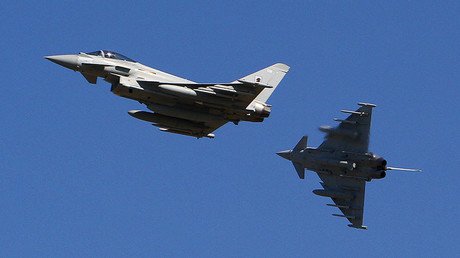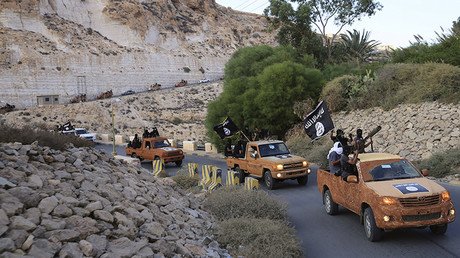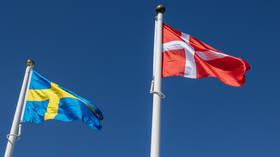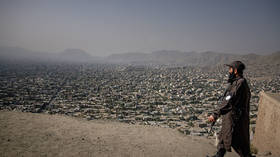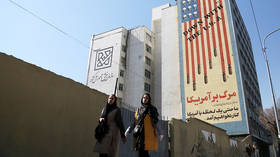‘5 horrible years’: Libya marks 5th anniversary of Western-backed uprising to oust Gaddafi
Libya’s Western-backed popular uprising officially began on February 17, 2011, resulting in the toppling of long-time leader Muammar Gaddafi. Since then, the oil-rich nation has been plunged into political chaos amid the growing threat of Islamic State.
The uprising proved to be a pre-cursor to NATO-led intervention in Libya, which would eventually result in the brutal killing of Gaddafi.
The outpouring of adulation and messages of support to the opposition forces from Western world leaders spoke of a ‘bright’ new dawn for Libya after Gaddafi’s toppling.
“People in Britain salute your courage, and while we are proud of the role we played to help, we know this was your revolution from your bravery from people in Benghazi, from people in Tripoli … You showed the world you would get rid of a dictator and choose freedom,” British Prime Minister David Cameron said during a 2011 visit to Benghazi.
However, five years on from the start of the uprising, Libya is in a markedly worse position. Its oil revenues have halved, while it is also facing a growing threat from Islamic State (IS, formerly ISIS/ISIL), which is looking to capitalize on the lack of political stability and political infighting.
‘Pain, tears, casualties, material and moral losses’
Ahmed Gaddaf Al-Dam, Gaddafi’s cousin, spoke to RT and said that Libya had witnessed “five horrible years” as a result of “NATO’s actions.”
“This is a day of sorrow and grief. On this day years back, Libya, which was once a stable and secure country has now been turned into a devastated one, with people fleeing their homes,” he said.
“Libya was once one of the leading countries of the continent has now become feudalized and oppressed. Now its fate lies in the hands of other countries. We have come to this day through pain, tears, casualties, material and moral losses. That is what we see now after five horrible years and it is the result of NATO’s actions – the alliance that invaded our country to destroy it,” he added.
Hafsa Kara-Mustapha, a political analyst, told RT about how the crisis in Libya is a direct result of the Western-led military intervention.
“The situation in Libya is very much a result of the NATO intervention and we knew we had the example of Iraq and the power vacuum, which was created there. Gaddafi was a bulwark against all these [Islamist] organizations,” she said.
Gaddafi warned about jihadists coming
It also emerged in January that Gaddafi tried to warn former British Prime Minister Tony Blair in 2011 that Islamic jihadists would attack Europe if his regime was allowed to collapse.
“They [jihadists] want to control the Mediterranean and then they will attack Europe.”
This was from a telephone conversation between the pair five years ago, the transcripts of which were released in January.
In a second conversation between the pair, Gaddafi said that Libya was also facing a real terrorist threat.
“We are not fighting them, they are attacking us. I want to tell you the truth. It is not a difficult situation at all. The story is simply this: an organization has laid down sleeping cells in North Africa. Called the Al-Qaeda Organization in North Africa … The sleeping cells in Libya are similar to dormant cells in America before 9/11.
“I will have to arm the people and get ready for a fight. Libyan people will die, damage will be on the Mediterranean, Europe and the whole world. These armed groups are using the situation [in Libya] as a justification – and we shall fight them,” Gaddafi added.
‘Side show’ for Washington?
Even despite many of Gaddafi’s warnings coming true, Washington still believes it did the right thing in overthrowing the regime in Libya.
“As for foreseeing what the threats were on the horizon back in 2011, let’s remember in 2011 we had Gaddafi on the ground threatening to massacre huge amounts of the Libyan population at the time,” deputy State Department spokesperson Mark Toner said in January. “And we stepped in with our NATO partners to prevent that threat and massacre of the people.”
Former US diplomat Jim Jatras told RT he believes that, for Washington, Libya is “something of a sideshow.”
“Having made a complete mess out of it, and then leaving it to go to create another mess in Syria and then bringing ISIS into being either intentionally or by accident – they don’t know what do to about that. Now they see it’s spreading, so they feel some kind of pressure to do something,” he said, adding that even within the US government there is “a total confusion” on the strategy.
The situation could also start to become a lot worse. In an interview with Reuters in February, Colonel Bob Wilson, Third Special Forces Group Commander, said that he does not see IS wanting to stop in Libya and instead the terrorist organization will look to use the country as a launch pad to attack other countries in the region.
"I think [ISIS] is going to expand beyond Libya where it can find subordinate elements to cooperate with," he said, adding that he was worried about "increased collusion and cooperation" between militant groups.
Hold NATO to account - Amnesty
With the fifth anniversary of NATO’s intervention in Libya the UK and US are contemplating taking steps to fight IS in the country. However, in a damming message, Amnesty International slammed the NATO coalition members, saying they need to be “held to account” for the “horrors that have unfolded in Libya.”
“Restoring the rule of law must go hand in hand with justice for widespread crimes and vital humanitarian support. The world must not fail Libyans in their hour of need,” said Said Boumedouha, deputy Middle East and North Africa director at Amnesty International.
“Over the past five years Libya has descended deeper into the abyss of human rights chaos, amid lawlessness, rampant abuse and war crimes by rival armed groups and militias, and the rising threat posed by the armed group calling itself Islamic state,” he added.
